Are gays, lesbians and others in the LGBT community accepted in Panama?
Renate Jope - Panama Premium Real Estate
I personally find that gays, lesbians and others in the LGBT community are very integrated and accepted all throughout Panama and not treated as taboo. There are more gay men than lesbians I have found, and the men are very heavily involved in the preparations and celebrations of the traditional carnival (Mardi Gras). They create the most fantastic costumes and floats, contributing to an amazing event every year.
Although Panama is not as advanced as to...
I personally find that gays, lesbians and others in the LGBT community are very integrated and accepted all throughout Panama and not treated as taboo. There are more gay men than lesbians I have found, and the men are very heavily involved in the preparations and celebrations of the traditional carnival (Mardi Gras). They create the most fantastic costumes and floats, contributing to an amazing event every year.
Although Panama is not as advanced as to accept same sex marriage. Not quite yet.
Posted April 2, 2013
Chris Frochaux - Chris Frochaux - SERVMOR REALTY
One would like to say that gays, lesbians and others in the LGBT community are well accepted in Panama. However, that would be a stretch... After all, until July 2008, sodomy was a crime punishable with up to one year of imprisonment. Like all of Latin America, Panama is a deeply religious country and, traditionally, homosexuality and religion have made poor bedfellows. Back in 2004, a bill legalizing civil unions was derailed thanks to vigorous opposition from the Catholic Church....
One would like to say that gays, lesbians and others in the LGBT community are well accepted in Panama. However, that would be a stretch... After all, until July 2008, sodomy was a crime punishable with up to one year of imprisonment. Like all of Latin America, Panama is a deeply religious country and, traditionally, homosexuality and religion have made poor bedfellows. Back in 2004, a bill legalizing civil unions was derailed thanks to vigorous opposition from the Catholic Church. Another bill (Proyecto de Ley 650, September 2013) is currently under way with the purpose of defining sexual discrimination as a crime. The Panama's National Scouts' Association excludes gay people from its ranks. (They have however expressed their willingness in helping current members to amend their sexual orientation). There is an active LGBT association in Panama called "Asociación Hombres y Mujeres Nuevos de Panamá" which sponsors annual Gay Pride Parades in the capital, usually at the end of June. Interestingly, several well-known politicians have started making appearances in those parades. (Coincidentally, by some estimates, up to 250,000 voters would be LGBT sympathizers). In a Gallup poll (2012) over one million Panamanians declared having gay friends.
It's obvious that the LGBT community in Panama has a long way to go before reaching full acceptance, but the level of discrimination is probably not worse than it is in many parts of the United States. Hate crimes are unheard of, for example... It's a fact that gays are heavily involved in Carnaval preparations - although that may sound a bit stereotypical - but it's noticeable that during Carnaval celebrations (a pivotal social event) straight and gay crowds mingle quite harmoniously. As in most places in Latin America, Panama is a long way towards civil rights equality and tolerance does not equate acceptance, but there are encouraging signs: the first Latin American and Caribbean Inter-Governmental Conference on Population and Development took place in Montevideo, Uruguay, on August 15, 2013, under the auspices of the United Nations. Panama joined 37 governments of the region and signed the groundbreaking MONTEVIDEO CONSENSUS to advance sexual and reproductive health and rights. Those governments agreed to design policies and programs aiming to eradicate discrimination based on sexual orientation and gender identity, asserting that violence against LGBT persons is a critical indicator of marginalization, placing them in a vulnerable position and preventing them from enjoying equal rights. Some will argue that those are theoretical steps, yet to be implemented, but the public opinion is undergoing a radical shift. First of all, the younger generations are infinitely more open-minded than their elders and from a more pragmatic perspective, the government is sure to grasp the increasing appeal and purchasing power of the gay tourism.
Posted January 11, 2014
Dennis Dean Smith - DennisDeanSmith
I have many friends in the LGBT gay and lesbian communities in Panama. Though 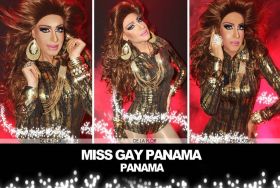 Chris is right about "official" unacceptance, Renate is also right about day-to-day acceptance. In fact, most "normal" Panamanians that I know of like to mix with gays and lesbians just like with anyone else. Gays are also popular on local Panama 'today' and comedy-type TV programs. My friends have never reported any violent altercations based on their sexual preferences....
Chris is right about "official" unacceptance, Renate is also right about day-to-day acceptance. In fact, most "normal" Panamanians that I know of like to mix with gays and lesbians just like with anyone else. Gays are also popular on local Panama 'today' and comedy-type TV programs. My friends have never reported any violent altercations based on their sexual preferences....
 Chris is right about "official" unacceptance, Renate is also right about day-to-day acceptance. In fact, most "normal" Panamanians that I know of like to mix with gays and lesbians just like with anyone else. Gays are also popular on local Panama 'today' and comedy-type TV programs. My friends have never reported any violent altercations based on their sexual preferences....
Chris is right about "official" unacceptance, Renate is also right about day-to-day acceptance. In fact, most "normal" Panamanians that I know of like to mix with gays and lesbians just like with anyone else. Gays are also popular on local Panama 'today' and comedy-type TV programs. My friends have never reported any violent altercations based on their sexual preferences.... I have many friends in the LGBT gay and lesbian communities in Panama. Though  Chris is right about "official" unacceptance, Renate is also right about day-to-day acceptance. In fact, most "normal" Panamanians that I know of like to mix with gays and lesbians just like with anyone else. Gays are also popular on local Panama 'today' and comedy-type TV programs. My friends have never reported any violent altercations based on their sexual preferences. That's good for everyone involved in my opinion.
Chris is right about "official" unacceptance, Renate is also right about day-to-day acceptance. In fact, most "normal" Panamanians that I know of like to mix with gays and lesbians just like with anyone else. Gays are also popular on local Panama 'today' and comedy-type TV programs. My friends have never reported any violent altercations based on their sexual preferences. That's good for everyone involved in my opinion.
 Chris is right about "official" unacceptance, Renate is also right about day-to-day acceptance. In fact, most "normal" Panamanians that I know of like to mix with gays and lesbians just like with anyone else. Gays are also popular on local Panama 'today' and comedy-type TV programs. My friends have never reported any violent altercations based on their sexual preferences. That's good for everyone involved in my opinion.
Chris is right about "official" unacceptance, Renate is also right about day-to-day acceptance. In fact, most "normal" Panamanians that I know of like to mix with gays and lesbians just like with anyone else. Gays are also popular on local Panama 'today' and comedy-type TV programs. My friends have never reported any violent altercations based on their sexual preferences. That's good for everyone involved in my opinion. Posted March 5, 2014
Randy Hilarski - High Impact Media Group Panama
Of all the countries I have lived in Panama seems to be the most accepting of alternative lifestyles, even with its strong Catholic background. My brother-in-law is gay and he has never complained about being harassed. Panamanian families are very accepting of their children's decisions. I love this country and the tolerance I see here.
Of all the countries I have lived in Panama seems to be the most accepting of alternative lifestyles, even with its strong Catholic background. My brother-in-law is gay and he has never complained about being harassed. Panamanian families are very accepting of their children's decisions. I love this country and the tolerance I see here.
Posted April 29, 2014
Joseph Ennis - Spanish Panama (Spanish language school)
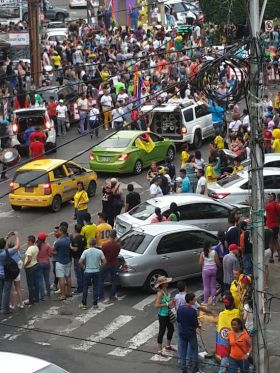
On June 28, outside the Colombian-run bar, Rana Dorado, the streets quickly fill up with cheering Colombians after their World Cup win over Uruguay (in lower right part of photo).
Only a few minutes later (upper left part of photo) Panama’s new LGBTI Gay Pride Parade comes around the corner of Via Argentina and happily head up across the American-run (from NY) New York Bagels.
This leads to an interesting and different exchange of human...

On June 28, outside the Colombian-run bar, Rana Dorado, the streets quickly fill up with cheering Colombians after their World Cup win over Uruguay (in lower right part of photo).
Only a few minutes later (upper left part of photo) Panama’s new LGBTI Gay Pride Parade comes around the corner of Via Argentina and happily head up across the American-run (from NY) New York Bagels.
This leads to an interesting and different exchange of human energies, each with its own reasons for celebration, and each wanting to celebrate around the (Albert) Einstein Statue as this was a formerly predominantly Jewish neighborhood.
The photos were taken by curious Dutch and Korean students from the view of the social terrace of Canadian & Panamanian-run Spanish language school “SpanishPanama.”
All of this is a fantastic testament to the increasing internationalism of Panama City’s central neighborhoods over the past decade. And this brand of globalism is having a positive effect on stretching and challenging minds, creating openness and broader social tolerance.
Posted July 10, 2014
Linda Jensen
It appears to me that there are plenty of gays, lesbians and LGBT here in Boquete, where I live. I’ve never seen any type of discrimination. I believe that in the Panamanian constitution that discrimination based on sexual orientation is not legal.
There may be social organization (clubs, get togethers, etc.) of gays, lesbians and LGBT in Boquete, but I’m not aware of it. There are, however, several businesses owned by and operated by gay...
There may be social organization (clubs, get togethers, etc.) of gays, lesbians and LGBT in Boquete, but I’m not aware of it. There are, however, several businesses owned by and operated by gay...
It appears to me that there are plenty of gays, lesbians and LGBT here in Boquete, where I live. I’ve never seen any type of discrimination. I believe that in the Panamanian constitution that discrimination based on sexual orientation is not legal.
There may be social organization (clubs, get togethers, etc.) of gays, lesbians and LGBT in Boquete, but I’m not aware of it. There are, however, several businesses owned by and operated by gay couples that do very well, so it doesn’t seem to be an issue at all.
We have lesbians as neighbors who have been here longer than we have.
There may be social organization (clubs, get togethers, etc.) of gays, lesbians and LGBT in Boquete, but I’m not aware of it. There are, however, several businesses owned by and operated by gay couples that do very well, so it doesn’t seem to be an issue at all.
We have lesbians as neighbors who have been here longer than we have.
Posted August 5, 2014
Paul McBride - Inside Panama Real Estate
Like most Latin countries, Panama tends to be a conservative society. However, Panama also enjoys one of the most cosmopolitan mixes of cultures and ethnicities in the Americas. The result is a much more tolerant and accepting atmosphere. Gays, lesbians and other members of the LGBT community celebrate their culture openly in Panama without restrictions. In my 17-years of experience in Panama I have never seen any hostility openly directed at people based on their...
Like most Latin countries, Panama tends to be a conservative society. However, Panama also enjoys one of the most cosmopolitan mixes of cultures and ethnicities in the Americas. The result is a much more tolerant and accepting atmosphere. Gays, lesbians and other members of the LGBT community celebrate their culture openly in Panama without restrictions. In my 17-years of experience in Panama I have never seen any hostility openly directed at people based on their sexual preferences.
That said, there might still be areas in Panama where the culture is more conservative and less accepting than in the city and other areas of the country with diverse populations.
In Boquete and Chiriquí, expats celebrate and embrace diversity and the LGBT community is actively involved in a variety of businesses, social events and community causes. This has raised awareness and tolerance in the wider community throughout the entire area.
That said, there might still be areas in Panama where the culture is more conservative and less accepting than in the city and other areas of the country with diverse populations.
In Boquete and Chiriquí, expats celebrate and embrace diversity and the LGBT community is actively involved in a variety of businesses, social events and community causes. This has raised awareness and tolerance in the wider community throughout the entire area.
Posted August 12, 2014
Dennis Dean Smith - DennisDeanSmith
Actually gays are very accepted. There is a gay-lesbian carnival every year. And the TV networks often feature gay comics (1-2 is the most popular).
Actually gays are very accepted. There is a gay-lesbian carnival every year. And the TV networks often feature gay comics (1-2 is the most popular).
Posted August 18, 2014
Pedro Torres
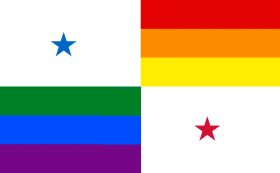 Gay, lesbians, and others in the LGBT community are accepted in Panama without a problem at all. People here are open-minded. So, if you are gay or lesbian, there wouldn’t be an issue if you want to live in Panama.
Gay, lesbians, and others in the LGBT community are accepted in Panama without a problem at all. People here are open-minded. So, if you are gay or lesbian, there wouldn’t be an issue if you want to live in Panama.  Gay, lesbians, and others in the LGBT community are accepted in Panama without a problem at all. People here are open-minded. So, if you are gay or lesbian, there wouldn’t be an issue if you want to live in Panama.
Gay, lesbians, and others in the LGBT community are accepted in Panama without a problem at all. People here are open-minded. So, if you are gay or lesbian, there wouldn’t be an issue if you want to live in Panama. Posted January 6, 2015
Jennifer Moloney Jones
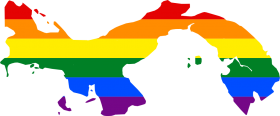 I have a lot of friends in the LGBT community here in Panama but there isn’t a big scene here like in London where you will find specific groups hopping from bar after bar. It is not generally flaunted here in Panama, which I think that generally comes from their culture and their religion, which is Catholicism. But there are certainly plenty of people here who are gay or lesbian or bi-sexual here in Panama. There is a group in Boquete that works closely together. In town here...
I have a lot of friends in the LGBT community here in Panama but there isn’t a big scene here like in London where you will find specific groups hopping from bar after bar. It is not generally flaunted here in Panama, which I think that generally comes from their culture and their religion, which is Catholicism. But there are certainly plenty of people here who are gay or lesbian or bi-sexual here in Panama. There is a group in Boquete that works closely together. In town here... I have a lot of friends in the LGBT community here in Panama but there isn’t a big scene here like in London where you will find specific groups hopping from bar after bar. It is not generally flaunted here in Panama, which I think that generally comes from their culture and their religion, which is Catholicism. But there are certainly plenty of people here who are gay or lesbian or bi-sexual here in Panama. There is a group in Boquete that works closely together. In town here in Panama City, there used to be a couple of bars but I think they have gone so now everybody just mixes and mingles during happy hours.
I have a lot of friends in the LGBT community here in Panama but there isn’t a big scene here like in London where you will find specific groups hopping from bar after bar. It is not generally flaunted here in Panama, which I think that generally comes from their culture and their religion, which is Catholicism. But there are certainly plenty of people here who are gay or lesbian or bi-sexual here in Panama. There is a group in Boquete that works closely together. In town here in Panama City, there used to be a couple of bars but I think they have gone so now everybody just mixes and mingles during happy hours. LGBT is not a big scene in Panama but people are not pointed out for it. My friends definitely do not feel like they are isolated or that people are mean to them because of being gay. They are quite open.
Posted March 20, 2015
Paul Kersbergen
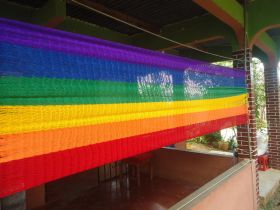 Short answer: in daily life Panama is generally safe for gays, lesbians and transgender people. Superficially, everyone seems to get along.
Short answer: in daily life Panama is generally safe for gays, lesbians and transgender people. Superficially, everyone seems to get along. Long answer: Being gay and talking about acceptance and discrimination is a huge taboo... You can really only feel and notice that if you are member of the LGBTI-community... I'm gay and run an LGBTI- organization, called: "Unión de la diversidad", so we have quite...
 Short answer: in daily life Panama is generally safe for gays, lesbians and transgender people. Superficially, everyone seems to get along.
Short answer: in daily life Panama is generally safe for gays, lesbians and transgender people. Superficially, everyone seems to get along. Long answer: Being gay and talking about acceptance and discrimination is a huge taboo... You can really only feel and notice that if you are member of the LGBTI-community... I'm gay and run an LGBTI- organization, called: "Unión de la diversidad", so we have quite an idea about what's going on around here. Although people do not really get harassed on the streets, over 80% (Pew research, 2014) is against gay-partnership. Hate-speech is very common (especially online), see some articles on "The Panama Observer" (linking is not allowed so I can't send the link here).
Police do abuse gay people if they feel like it. We have a file with many reported cases that are not solved or looked into.
Some people do lose their jobs is if they openly come out of gay. It is our estimation that 60-80% are in fact in the closet. We have had cases of people who were thrown out of their parent's house and are forced to live on the streets. I know lawyers, doctors, business owners and politicians, that have to live inside the famous "closet," because they are afraid for their careers (and with reason).
There is enormous stigmatization going on here; gays are generally seen as feminine / hairdressers / make-up artists, but any other type of career will be very hard for an openly gay or lesbian person. We offer a weekly support group for LGBTI (first in Panama) and talk a lot about these topics; it's shocking to hear and see what comes up. Many people confuse being gay with pedophilia or zoofilia, which is very painful for us as gays.
Some real estate ads will say: "No gays"... Just this week we started a case against someone regarding that advertisement. This happens frequently.
The gay pride; it seems like this is all going smoothly, but this year the stage was ruined right before the parade. Possibly this was directed against the gay-community. I've walked with the gay pride and there are many people looking at the parade and shouting vulgarities such as "dirty gays," "You are all going to hell" This is something I have never experienced anywhere else, but then again, I mostly traveled in Europe.... My advice is to be careful, live in an upscale area, pick good friends and keep your expectations regarding acceptance very low.
(Rainbow Hammock hand made in Panama, pictured.)
Posted September 3, 2015
Jesahely De Janon - Panama Property Attorneys
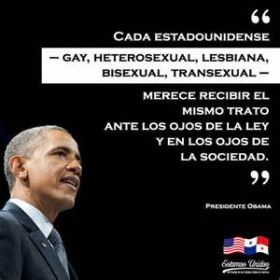 Gays and lesbians are accepted in Panama. Two years ago, they had a parade along Via Argentina (the main street in Panama City). There will always be groups that do not accept them and are totally against their lifestyle but these groups are not violent against gays and lesbians.
Gays and lesbians are accepted in Panama. Two years ago, they had a parade along Via Argentina (the main street in Panama City). There will always be groups that do not accept them and are totally against their lifestyle but these groups are not violent against gays and lesbians.There are gay establishments and gay bars in Panama. They also have carnivals and parades.
(Proclamation that June is Gay Pride Month from President Obama to Panama through...
 Gays and lesbians are accepted in Panama. Two years ago, they had a parade along Via Argentina (the main street in Panama City). There will always be groups that do not accept them and are totally against their lifestyle but these groups are not violent against gays and lesbians.
Gays and lesbians are accepted in Panama. Two years ago, they had a parade along Via Argentina (the main street in Panama City). There will always be groups that do not accept them and are totally against their lifestyle but these groups are not violent against gays and lesbians.There are gay establishments and gay bars in Panama. They also have carnivals and parades.
(Proclamation that June is Gay Pride Month from President Obama to Panama through the US embassy, pictured.)
Posted October 16, 2015
Manzar Lari - Casa de Montaña
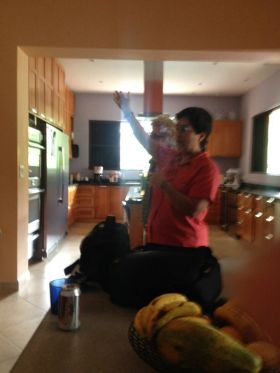 One of my partner's and my primary concerns when we started thinking about moving to a country like Panama was to see how accepting they are to the LGBT people. We we’re pleasantly surprised. Even though Panama is a religious Catholic county and they don’t have gay marriage here, they are very accepting on a personal level and on a social level.
One of my partner's and my primary concerns when we started thinking about moving to a country like Panama was to see how accepting they are to the LGBT people. We we’re pleasantly surprised. Even though Panama is a religious Catholic county and they don’t have gay marriage here, they are very accepting on a personal level and on a social level.We even formed a LGBT group here in Boquete about two years ago, because there were a number of expats who...
 One of my partner's and my primary concerns when we started thinking about moving to a country like Panama was to see how accepting they are to the LGBT people. We we’re pleasantly surprised. Even though Panama is a religious Catholic county and they don’t have gay marriage here, they are very accepting on a personal level and on a social level.
One of my partner's and my primary concerns when we started thinking about moving to a country like Panama was to see how accepting they are to the LGBT people. We we’re pleasantly surprised. Even though Panama is a religious Catholic county and they don’t have gay marriage here, they are very accepting on a personal level and on a social level.We even formed a LGBT group here in Boquete about two years ago, because there were a number of expats who are lesbian and gay living in this area and others who are thinking of moving here, so we wanted to provide a venue for people to be able to get together or ask questions or feel supported. The group is also for those who may be coming out or maybe don’t have a place to go. We’ve had a number of Panamanians also join us in our monthly meetings.
I feel pretty much the same way about the rest of Panama. I don’t know as much about it but we know somebody who is pretty involved in the community in Panama City. He does meetings and gatherings and they have gay pride parade at the end of June every year. So LGBT people are a visible minority in Panama.
I have not seen any overt discrimination as far as rentals and purchase of properties or things like that or any kind of violence, verbal or physical, of any sort against LGBT people in Panama.
(LGBT meeting with Spanish translator at Casa de Montana, Boquete, Panama, pictured.)
Posted March 18, 2016
Elcira Maimone
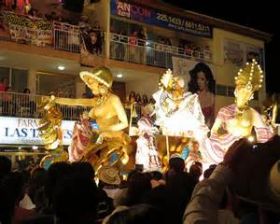 In the Azuero Peninsula of Panama, where the province of Chitré is located, there is an LGBT community. It’s very normal here and people do not see it as a problem. Gays and lesbians are integrated into the community here and the community loves them.
In the Azuero Peninsula of Panama, where the province of Chitré is located, there is an LGBT community. It’s very normal here and people do not see it as a problem. Gays and lesbians are integrated into the community here and the community loves them.We are Catholic but gays and lesbians are accepted here. They are not tagged as bad people. They are all accepted in the community. There is no discrimination at all. We even have a carnival, which is like a party...
 In the Azuero Peninsula of Panama, where the province of Chitré is located, there is an LGBT community. It’s very normal here and people do not see it as a problem. Gays and lesbians are integrated into the community here and the community loves them.
In the Azuero Peninsula of Panama, where the province of Chitré is located, there is an LGBT community. It’s very normal here and people do not see it as a problem. Gays and lesbians are integrated into the community here and the community loves them.We are Catholic but gays and lesbians are accepted here. They are not tagged as bad people. They are all accepted in the community. There is no discrimination at all. We even have a carnival, which is like a party where all the people come here and the LGBT community is included in that carnival just like everyone.
(Carnival parade, Panama, pictured.)
Posted April 16, 2016
Mirhanna Sandoya - Lucero Homes Golf & Country Club
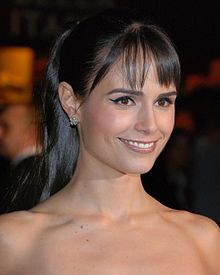 The LGBT community is accepted in Panama. As we are more Americanized than any other country in Latin America, Panamanians are more open-minded. Panamanians accept differences the same way that we accepted all types of races. For example, when I was in school, I had classmates who were from Saudi Arabia, Jordan, the United States, Canada, Costa Rica, Colombia, and all these other countries, and I grew up to not tell any difference. Panamanians know that we’re all humans, and...
The LGBT community is accepted in Panama. As we are more Americanized than any other country in Latin America, Panamanians are more open-minded. Panamanians accept differences the same way that we accepted all types of races. For example, when I was in school, I had classmates who were from Saudi Arabia, Jordan, the United States, Canada, Costa Rica, Colombia, and all these other countries, and I grew up to not tell any difference. Panamanians know that we’re all humans, and... The LGBT community is accepted in Panama. As we are more Americanized than any other country in Latin America, Panamanians are more open-minded. Panamanians accept differences the same way that we accepted all types of races. For example, when I was in school, I had classmates who were from Saudi Arabia, Jordan, the United States, Canada, Costa Rica, Colombia, and all these other countries, and I grew up to not tell any difference. Panamanians know that we’re all humans, and we’re all living under the same rules and regulations, so there are really no differences.
The LGBT community is accepted in Panama. As we are more Americanized than any other country in Latin America, Panamanians are more open-minded. Panamanians accept differences the same way that we accepted all types of races. For example, when I was in school, I had classmates who were from Saudi Arabia, Jordan, the United States, Canada, Costa Rica, Colombia, and all these other countries, and I grew up to not tell any difference. Panamanians know that we’re all humans, and we’re all living under the same rules and regulations, so there are really no differences. When the Canal was built, there were so many people coming in from other countries, and I think culturally, for many years, we have learned to adapt and accept differences, so that now, around the world where everybody’s deciding and debating whether they should accept something or not, here in Panama, we just accept things. Panamanians are used to change.
(American actress Jordana Brewster was born in Panama City, Panama, pictured.)
Posted January 11, 2017


